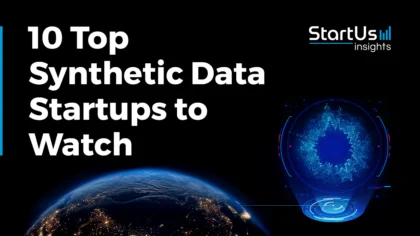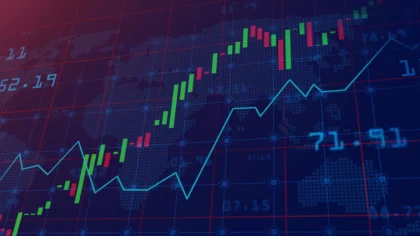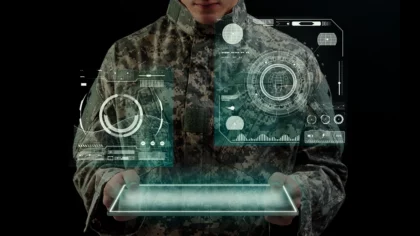Accelerate Productivity in 2025
Reignite Growth Despite the Global Slowdown
As the world becomes increasingly reliant on technology, businesses need to safeguard digital assets, systems, and networks from malicious activities. Companies use a broad spectrum of practices to enhance digital security, protect sensitive data, and promote proactive defense against cyber-attacks. Some cybersecurity examples include encryption, access control, risk assessment, threat detection, incident response, and IT security applications.
Threats in the cybersecurity landscape are constantly evolving, ranging from relatively simple attacks like phishing emails to advanced persistent threats (APTs) and zero-day exploits. Cybersecurity solutions need to stay up-to-date with the latest developments in the field to effectively combat these threats. In the following sections, you will explore various cybersecurity use cases, demonstrating their implementation across different industries and sectors.
Tree Map reveals the Use of Cybersecurity in 10 Industries
Based on the Innovation Map, the Tree Map below illustrates cybersecurity applications across 10 industries in 2024. Cybersecurity safeguards critical assets and data from cyber threats and attacks across multiple industries. In the fintech sector, cybersecurity ensures secure digital transactions and maintains the integrity of online banking platforms. The defense & military industry and governments heavily rely on cybersecurity to safeguard sensitive military data and protect communication networks against cyber espionage.
In the energy industry, cybersecurity protects critical infrastructure, such as power grids, and safeguards intellectual property, protecting against digital piracy. Manufacturing companies use cybersecurity to protect operational technology (OT) devices from cyber threats, while retail businesses utilize it to protect customer data. In healthcare institutions, the application of cybersecurity involves the protection of patient records.
Media and telecommunications companies implement cybersecurity to protect communication networks and ensure data privacy for customers. Finally, vehicle manufacturers use cybersecurity to safeguard connected vehicles and autonomous driving systems.
Global Startup Heat Map covers 5567 Cybersecurity Startups & Scaleups
The Global Startup Heat Map below highlights the global distribution of the 5567 exemplary startups & scaleups that we analyzed for this research. Created through the StartUs Insights Discovery Platform that covers 3 790 000+ startups & scaleups globally, the Heat Map reveals that the US has a high concentration of cybersecurity startups, followed by Europe and India.
Below, you get to meet 10 out of these 5567 promising startups & scaleups as well as the solutions they develop. These 10 startups are hand-picked based on criteria such as founding year, location, funding raised, & more. Depending on your specific needs, your top picks might look entirely different.
Examples of Cybersecurity across 10 Industries
1. FinTech
The fintech industry is one of the major sectors that use cyber security and applications to ensure the protection of sensitive financial data and to counter cyber threats. Fintech companies rely on robust cybersecurity platforms to safeguard customer information, utilizing encryption, access controls, and secure data storage. Fraud detection and prevention systems also employ machine learning algorithms to identify and mitigate fraudulent activities, safeguarding against financial losses.
Some cybersecurity platforms leverage AI to automate threat identification and response. Continuous monitoring and threat intelligence further enhance cybersecurity defenses. They defend financial operations against emerging threats and enable a secure fintech and banking ecosystem.
Humanize aids Cyber Risk Quantification
Humanize is a US-based startup that focuses on AI applications in cybersecurity to help financial institutions quantify their cyber risk. The startup’s platform, Salience, leverages AI to scan companies’ attack surfaces, identify security weaknesses and vulnerabilities, and then score their severity, likelihood, and business impact. It also generates remediation playbooks that help them prioritize and fix their most critical security issues.
Humanize’s platform analyzes large amounts of data to identify potential threats. It also offers a variety of training and awareness programs to help protect employees from phishing and other social engineering attacks. This allows FIs to make more informed decisions about how to allocate their security resources and prioritize their remediation efforts.
2. Defence & Military
Military organizations rely on classified information for operations, making its protection crucial. Robust measures, including encryption and access controls, safeguard critical information against unauthorized access or disclosure. Interconnected military networks face cyber threats, demanding security measures to prevent breaches and denial-of-service (DoS) attacks.
Cyber warfare also poses risks to military objectives, necessitating strong defenses like advanced threat detection and incident response protocols. To secure their networks, military establishments deploy cybersecurity solutions like firewalls, intrusion detection systems (IDS), and intrusion prevention systems (IPS). They also use endpoint security solutions that safeguard devices like computers, smartphones, and other equipment. These solutions prevent malware, ransomware, and other cyber threats from compromising these devices and the network.
CCX Technologies offers a Defense Cybersecurity Platform
Canadian startup CCX Technologies develops Cyber, a cybersecurity platform for the defense and aerospace sectors. The startup’s proprietary software, SystemX, provides platform-level cybersecurity and avionics radio testing. It enables military agencies to monitor and defend military networks and onboard military vehicles engaged in air, land, and sea missions.
SystemX monitors and protects military communication networks on air, land, and sea vehicles. It also utilizes an intrusion detection system (IDS) to monitor and transmit critical military data around the globe. Military agencies employ it alongside other hardware to configure it as a remote appliance or a stand-alone system for cybersecurity.
3. Healthcare
Within the healthcare industry, patient data protection using encryption, access controls, and data loss prevention techniques shields sensitive information from breaches. Hospitals also use medical device security platforms to guard against unauthorized access and tampering, ensuring their integrity and functionality. The implementation of network security defends against malware, ransomware, and unauthorized entry, employing firewalls, intrusion detection systems, and network segmentation.
Moreover, hospitals’ telemedicine and remote patient monitoring services rely on secure channels, encryption, and authentication to safeguard interactions and monitoring data. Overall, cybersecurity’s role in healthcare encompasses protecting data, securing devices and systems, maintaining privacy, and fortifying critical infrastructure.
Heal Security delivers Cybersecurity for Medical Devices
Heal Security is a US-based startup that develops a cybersecurity platform for the healthcare sector. The platform addresses data breach and medical device hacking risks by continually monitoring, gathering, and prioritizing cyber threat, risk, and research data from government, public and private datasets in real time. It then converts it into actionable intelligence, alerts, and insights that healthcare organizations utilize to identify, assess and neutralize attacks on medical devices.
The startup’s suite of cybersecurity solutions also features real-time security inspection, and proactive advice to prevent cyber attacks. The platform employs AI to provide cognitive cybersecurity insights which reduce the signal-to-noise ratio in threat detection within the healthcare sector.
4. Energy
Cybersecurity measures protect critical infrastructure like power plants and distribution networks from unauthorized access and system disruptions. Such solutions secure supervisory control and data acquisition systems (SCADA) that monitor and control energy processes. This prevents data manipulation and unauthorized entries. Energy companies also utilize cybersecurity solutions to protect their information technology (IT) networks and sensitive data. This includes customer information, financial data, and intellectual property.
Cybersecurity measures such as firewalls, intrusion detection systems, and encryption minimize the risk of data theft or ransomware attacks. Incident response systems minimize the impact of cyber incidents and enable quick recovery. Prioritizing cybersecurity ensures reliable and secure energy delivery while reducing risks associated with cyber threats.
Norgald develops Grid Protection Tool for Utilities
Swedish startup Norgald provides Elvira, a research-based software tool for analyzing cyber risks in power grids. Utilities use Elvira to map the components of the electrical grid to create a digital architecture. This enables them to identify vulnerabilities in the IT) and operational technology (OT) components faster.
It provides a comprehensive analysis of current cyber risks and consequences to facilitate the creation of a security strategy to build resilience against cyber attacks within the grid. This enables utilities to avoid cyber attacks such as ransomware and avoid the annual costs associated with it.
5. GovTech
Cybersecurity in the GovTech industry encompasses various critical applications. First, data encryption, access controls, and secure storage are imperative to safeguard sensitive government information. Government agencies ensure network security through firewalls, intrusion detection systems, and virtual private networks (VPNs). This mitigates unauthorized access and cyber threats.
Incident response systems also automatically address security breaches and minimize disruption in operations. Additionally, election security measures maintain the integrity of voting processes and instill public confidence. Overall, robust cybersecurity measures enable governments to deliver efficient and secure public services while safeguarding trust and national security.
Immuniweb offers Dark Web Monitoring for Local Governments
Immuniweb is a Swiss startup that offers an eponymous AI-based cybersecurity platform for local governmental bodies. The platform scans for vulnerabilities in web applications and application programming interfaces (APIs). The platform also monitors the dark web to identify instances of sale or exposure of sensitive information or data on the dark web.. It secures government applications and cloud infrastructure, preventing data breaches and maintaining compliance adherence.
Moreover, the platform provides both automated and manual penetration testing which enables governmental agencies to identify hidden and complicated bugs in security. It also offers a self-service interface to provide government IT teams with granular control to schedule and monitor tests according to client needs.

6. Media
The media industry relies heavily on intellectual property (IP) such as movies, TV shows, music, and digital content. Cybersecurity tools safeguard these assets from unauthorized access, piracy, and copyright infringement. Media companies utilize techniques like digital rights management (DRM), watermarking, and encryption to protect media files and prevent unauthorized distribution. Streaming brands also use cybersecurity measures to protect streaming services from piracy, unauthorized access, and illegal streaming.
Compliance with data protection regulations like the General Data Protection Regulation (GDPR) requires media companies to implement robust security measures to safeguard user privacy. Deploying encryption, authentication mechanisms, and secure transmission protocols prevent piracy, signal manipulation, and unauthorized content insertion.
Stairwell enables Real-Time Threat Analysis
US-based startup Stairwell provides a comprehensive and automated cybersecurity platform for media organizations. The platform uses AI to automate traditionally manual threat analysis, detection, and incident response. It also provides continuous retrospective analysis of files for media companies to identify variants of malicious files rapidly. Stairwell enables rapid and comprehensive analysis of identified threats, allowing security teams to respond quickly and contain the impact of breaches of IP.
7. Manufacturing
Manufacturing companies handle a vast amount of proprietary data, including product designs, customer information, and financial records. Cybersecurity solutions encrypt and protect this data from unauthorized access, theft, or manipulation. This ensures confidentiality and compliance with data protection regulations. They also protect operational technology (OT) systems from cyber threats, ensuring continuous and safe operation. This prevents manufacturing disruptions and reduces the risk of equipment damage or physical harm.
Cybersecurity solutions also assess and manage the cyber risk of each participant in the supply chain to establish secure communication channels and monitor potential cyber threats. Robust cybersecurity measures, including encryption. This prevents compromise on the quality, delivery, and safety of products.
Byos improves Manufacturing Cybersecurity
Byos is a Canadian startup that makes a cybersecurity platform for the manufacturing industry. The platform uses device hardening and multi-factor authentication (MFA). The startup also adopts novel cybersecurity solutions, such as edge micro-segmentation, to secure legacy devices, prevent lateral movement, and significantly reduce the attack severity. This allows manufacturers to enhance remote access security, and gain greater control over their network, protecting assets and client IPs.
8. Retail
Retailers process numerous credit and debit card transactions daily, making them attractive targets for cybercriminals. Cyber security technology applications and policies, such as secure payment gateways, tokenization, and point-to-point encryption (P2PE), prevent card data theft and fraud. As online shopping continues to grow, retailers need robust cybersecurity measures to secure their e-commerce platforms. This includes protecting customer login credentials, securing online payment processes, and safeguarding against common threats like phishing attacks and e-skimming.
Implementing firewalls, intrusion detection systems (IDS), virtual private networks (VPNs), and regular security audits protect against unauthorized access, malware, and network-based attacks. Having incident response plans in place enables retailers to detect, contain, investigate, and recover from cyber attacks swiftly. This includes having backup systems, disaster recovery plans, and incident response teams in place.
ZERON simplifies eCommerce Risk Management
Indian startup ZERON offers a cybersecurity and risk management platform for e-commerce businesses. By allowing companies to upload data about their cyber awareness activities, its AI tracks and improves cyber preparedness over time. It also features a dashboard that displays crucial information about upcoming security audits. This empowers businesses to be well-prepared and compliant with industry standards.
The platform thus quantifies cyber threats and incidents mapped with the potential revenue losses due to those threats. Further, the dashboard includes security statistics like breach probability for a better understanding of the security state of the business. ZERON’s solution ensures effective planning and tracking of cybersecurity projects.
9. Telecommunications
One of the primary ways the telecom sector uses cybersecurity solutions is to protect against distributed denial of service (DDoS) attacks. By employing DDoS protection systems, telecom companies detect and mitigate large-scale attacks that disrupt services. Telecom providers also handle vast amounts of sensitive customer data, including personal information, call records, and financial details. Companies protect this data through data encryption, access controls, and secure storage practices.
The telecommunications industry is also subject to data protection and privacy regulations like GDPR. Cybersecurity tools enable telecom companies to comply with these regulations, avoid penalties, and maintain customer trust. Overall, cybersecurity is vital in the telecommunications industry to protect sensitive data, maintain network integrity, and ensure uninterrupted and secure communication services for customers.
BlackDice delivers AI-based Cybersecurity for Telecom
BlackDice is a UK-based startup that provides telecom operators with an enterprise-grade cyber defense platform for their consumers and subscribers. Its AI-powered platform analyzes various data points across multiple subscriber devices to identify signals and potential threats. It utilizes machine learning to predict and prevent cyber-attacks on the device, on any network.
The solution also uses device fingerprinting to protect privacy while monitoring behavior and automatically takes remedial action against compromised apps, devices, and websites. Moreover, BlackDice offers device management services to protect devices from external threats, set rules, filter content, and more. It creates a safer environment on wifi networks and mobile data. This platform solution helps telecom operators create new services, reduce churn, and increase revenue by building trust with their customers.
10. Automotive
Cars are becoming more connected to the internet and communicate with various external systems such as navigation services and mobile devices. This also makes them vulnerable to cyber threats. Automobile manufacturers integrate in-car cybersecurity platforms to protect cars against unauthorized access, data breaches, and or sabotage of critical vehicle systems. It also ensures the integrity, authenticity, and confidentiality of the transmitted data in vehicle-to-vehicle (V2V) and vehicle-to-infrastructure (V2I) communication systems.
These measures prevent malicious actors from tampering with communications or injecting false information. As software-defined vehicle makers now deliver software updates to vehicles remotely, cybersecurity platforms safeguard these updates by ensuring the authenticity and integrity of the software packages. This prevents unauthorized modifications and protects against malware injection during the update process.
Veecle develops a Security-focused Connected Vehicle Software Stack
German startup Veecle provides a security-focused software stack for connected vehicles, written in Rust. Its software enhances existing hardware by adding security functions, enabling seamless integration with manufacturer cloud services while ensuring robust protection. Its operating system (OS), NoS, enables granular control over all car features whilst enabling smart car features such as over-the-air (OTA) updates.
Along with enabling connected car features, NoS acts as a secure gateway to the vehicle. It allows only authenticated access to vehicle data and authentication of OTA packages before pass-through. This creates a highly secure in-vehicle domain, enabling domain separation and access control. Veecle’s software stack integrates and extends connected car features in existing hardware, saving cost and time for car manufacturers while ensuring robust security.
Discover All Cyber Security Examples & Startups
Apart from the list of cyber security technologies above, AI and blockchain will play a crucial role in enabling precise tracking of digital assets and optimizing security protocols. Additionally, developments in biometric authentication and behavior-based cybersecurity systems will offer new ways to strengthen digital defenses without excessive reliance on traditional passwords. Unlike traditional encryption methods, quantum encryption relies on mathematical complexity, leveraging the principles of quantum mechanics to secure data. This provides potentially unbreakable encryption.
Together, these innovations and examples of cyber security have the potential to redefine the cybersecurity landscape and enhance overall digital resilience. Get in touch to explore specific cybersecurity technology examples, firms, and solutions that can advance your organization’s security posture!



![10 Top Digital Twin Startups and Companies for Industry 4.0 [2025]](https://www.startus-insights.com/wp-content/uploads/2025/06/Digital-Twin-Startups-for-Industry-4.0-SharedImg-StartUs-Insights-noresize-420x236.webp)





